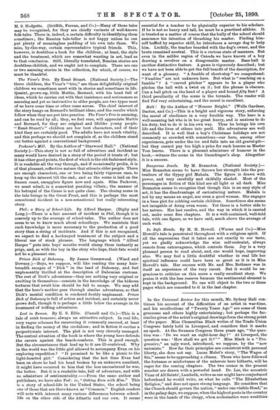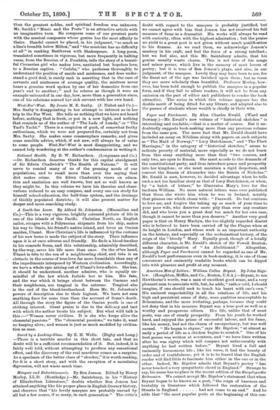In the Universal Review for this month, Mr. Sydney Hall
con- tinues his account of the difficulties of an artist in war-time, and his recollections of "Twenty Years Ago" are some of them gruesome and others highly entertaining ; but perhaps the fac- similes given of the artist's original drawings form the strong point of the paper. Miss Clementina Black writes of the Trade-Union Congress lately held in Liverpool, and considers that it marks an epoch. At the Swansea Congress three years ago, "the ques- tion was : Do we want an eight-hour day ? ' At Liverpool, the question was : 'How shall we get it ? " Miss Black is a "Pro-. gressive," an ugly word, introduced, we suppose, by the "new unionists." How far their principles are consistent with personal liberty, she does not say. Lucas Malet's story, " The Wages of Sin," seems to be approaching a climax. Those who have followed the fortunes or misfortunes of the unheroic hero hitherto, will be eager for the coming chapters. The two scenes in the present number are drawn with a powerful hand. Dr. Lee, the eccentric Vicar of All Saints', Lambeth, writes as one might have conjectured beforehand he would write, on what he calls " The Elizabethan Religion," and does not spare strong language. He considers that the Church should govern the nation, " under one visible Head," as in the palmy days, we suppose, when the highest posts in the country were in the hands of the clergy, when ecclesiastics were wealthier than the greatest nobles, and spiritual freedom was unknown. Mr. Smith's "Music and the Poets" is an attractive article with an imaginative turn. He compares some of our greatest poets with the musical composers whose genius has the most affinity to theirs. Handel cannot be placed, in his judgment, " so much as a line's breadth below Milton," and "the musician has no difficulty at all" in ranking Beethoven with Shakespeare. A long poem, translated sometimes in vigorous, but more frequently in halting verse, from the Russian of A. Pooshkin, tells the story of a beauti- ful Circassian girl who makes love, unstinted but hopeless love, to a Russian captive. " Ccelebs," who professes thoroughly to understand the position of maids and mistresses, and does under- stand a good deal, is surely rash in asserting that in the case of servants and mistresses of average quality, the mistress never hears a genuine word spoken by one of her domestics from one year's end to another ;" and he relates as though it were an example unheard of in our day, how, more than a generation since, one of his relations nursed her sick servant with her own hand.







































 Previous page
Previous page